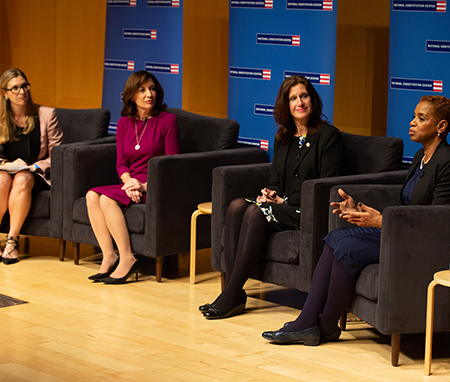As part of the National Constitution Center's two-day celebration commemorating Juneteenth, join a conversation with William B. Allen of Michigan State University and Hasan Kwame Jeffries of The Ohio State University exploring the history and meaning of the holiday, its connection to July 4 and the Declaration of Independence, and more. Jeffrey Rosen, president and CEO of the National Constitution Center, moderates.
Video
Podcast
Participants
William B. Allen is a resident scholar and the former chief operating officer of the Center for Urban Renewal and Education. He is emeritus professor of political philosophy in the department of political science and emeritus dean of James Madison College at Michigan State University. Allen formerly served on the U.S. National Council on the Humanities and as the chairman and member of the United States Commission on Civil Rights. He is the author of several books, the most recent of which is The State of Black America: Progress, Pitfalls, and the Promise of the Republic.
Hasan Kwame Jeffries is associate professor of history at The Ohio State University where he teaches courses on the Civil Rights and Black Power Movement. He is the author of Bloody Lowndes: Civil Rights and Black Power in Alabama’s Black Belt. He hosts the podcast Teaching Hard History, a production of the Southern Poverty Law Center’s educational division, Teaching Tolerance. He has also contributed to several documentary film projects, including the Emmy nominated PBS documentary Black America Since MLK.
Jeffrey Rosen is the president and CEO of the National Constitution Center, a nonpartisan nonprofit organization devoted to educating the public about the U.S. Constitution. Rosen is also professor of law at The George Washington University Law School and a contributing editor of The Atlantic.
Additional Resources
- Constitution Daily blog, "Juneteenth: Understanding the Origins"
- "Dr. Hasan Kwame Jeffries delivers Juneteenth address at The College of Wooster"
- William B. Allen, “To Preserve, Protect, and Defend: The Emancipation Proclamation,” in The Political Thought of the Civil War, ed. Alan Levine, Thomas Merrill, and James Stoner, Jr.
- Abraham Lincoln, The Emancipation Proclamation (1863)
- The Confiscation Acts of 1861 and 1862
- The Battle of Antietam
- William B. Allen, Original Intent, "Best Friends: The Declaration of Independence and the Constitution"
- National Constitution Center, We the People Podcast, "Juneteenth and the Constitution"
- National Constitution Center, Interactive Constitution, "Interpertation: The Slave Trade Clause"
- The New York Times Magazine, "The 1619 Project"
- Hasan Kwame Jeffries, Teaching Hard History, "Preface"
- National Constitution Center, Interactive Constitution, "Interpretation: Article I, Section 2"
TRANSCRIPT
This transcript may not be in its final form, accuracy may vary, and it may be updated or revised in the future.
Stay Connected and Learn More
Continue the conversation on Facebook and Twitter using @ConstitutionCtr.
Sign up to receive Constitution Weekly, our email roundup of constitutional news and debate, at bit.ly/constitutionweekly.
Please subscribe to Live at the National Constitution Center and our companion podcast We the People on Apple Podcasts, Stitcher, or your favorite podcast app.
To watch National Constitution Center Town Hall programs live, check out our schedule of upcoming programs. Register through Zoom to ask your constitutional questions in the Q&A or watch live on YouTube.








